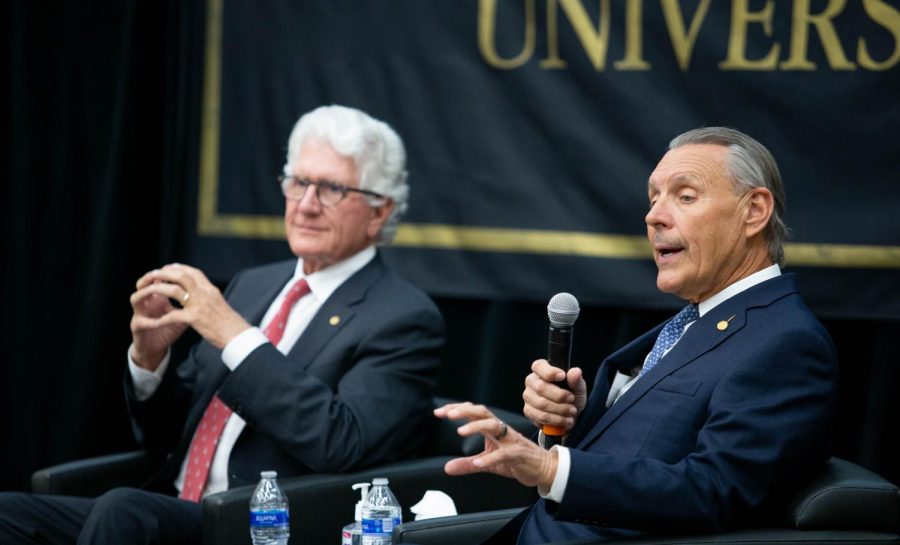Former U.S. Ambassadors visit OU to discuss Abraham Accords
Photo courtesy of John McTaggart
Former U.S. ambassadors David Fischer and John Rakolta Jr. visited OU on March 29 for a discussion about the Abraham Accords.
On Tuesday, March 29, David Fischer, former U.S. ambassador to Morocco, and John Rakolta Jr., former ambassador to the United Arab Emirates (UAE), visited Oakland University for a discussion on the historic Abraham Accords.
The Abraham Accords are a series of treaties normalizing diplomatic relations between Israel, Morocco, Bahrain, Sudan and the UAE.
“It’s complete and thorough recognition of each other. In Morocco’s case — while they had a back channel over a number of years — there was no exchange of ambassadors,” Fischer said. “There were no direct flights. There were no ministerial meetings and there was very little commerce. We pretty much ignored Israel for 50 years.”
Fischer likens the accords to a “refreshing of a relationship.” Under the terms of the accords, there has been an exchange of ambassadors, travel restrictions have been lifted and new embassies have been opened.
“The Abraham Accords is a simple aspirational agreement — that peace and prosperity is better than violence, war and death,” Rakolta said. “We can see today how important the difference is by what’s happening in Ukraine.”
Rakolta said that creating economic ties will integrate their societies in a way which will guarantee that they remain allies for a long time to come.
“Trade between Israel and the UAE has expanded 20 fold — almost 3 billion in 2021,” Rakolta said. “The amount of investment that’s going back and forth is unprecedented proportions. [The] UAE just committed $10 billion to invest in startups in Israel.”
Both ambassadors agree that the cultural similarities between Israel and other gulf nations outweigh their differences.
“From a cultural basis — whether it’s art, film, literature or education — they’re becoming much closer and bound together,” Rakolta said. “They [also share] common languages — both Arabic and English.”
A major factor in the willingness of these nations to make peace is their mutual distrust of Iran and desire for increased protection.
“If you strip away the politics — [the UAE and Israel] both have a common interest,” Rakolta said. “That common interest is protecting themselves against Iran.”
Fischer expressed that many gulf nations view the Iran deal — which was spearheaded by the U.S. during the Obama Administration was a mistake.
“Everybody is afraid of Iran. Iran is the bad actor [and] evil-doer,” Fischer said. “They’ve got the money. They’re funding [terrorists] because they hate Israel and they hate the United States.”
Both ambassadors believe that widespread peace throughout the Middle East will encourage diplomatic discussion between Israel and Palestine.
“[With the] missile attacks that were going on into Israel last year — [the UAE was] part of the solution with Egypt and Jordan,” Rakolta said. “[They are assisting] to bring peace to this region — they will participate in that discussion as opposed to standing back and watching it unravel.”
Rakolta likened the Abraham Accords to the famous Neil Armstrong quote — “one small step for man, one giant leap for mankind.”
“[These nations] took one small step to normalize relations with Israel — but one giant leap for the entire region and you’re starting to see that come to fruition,” Rakolta said.






